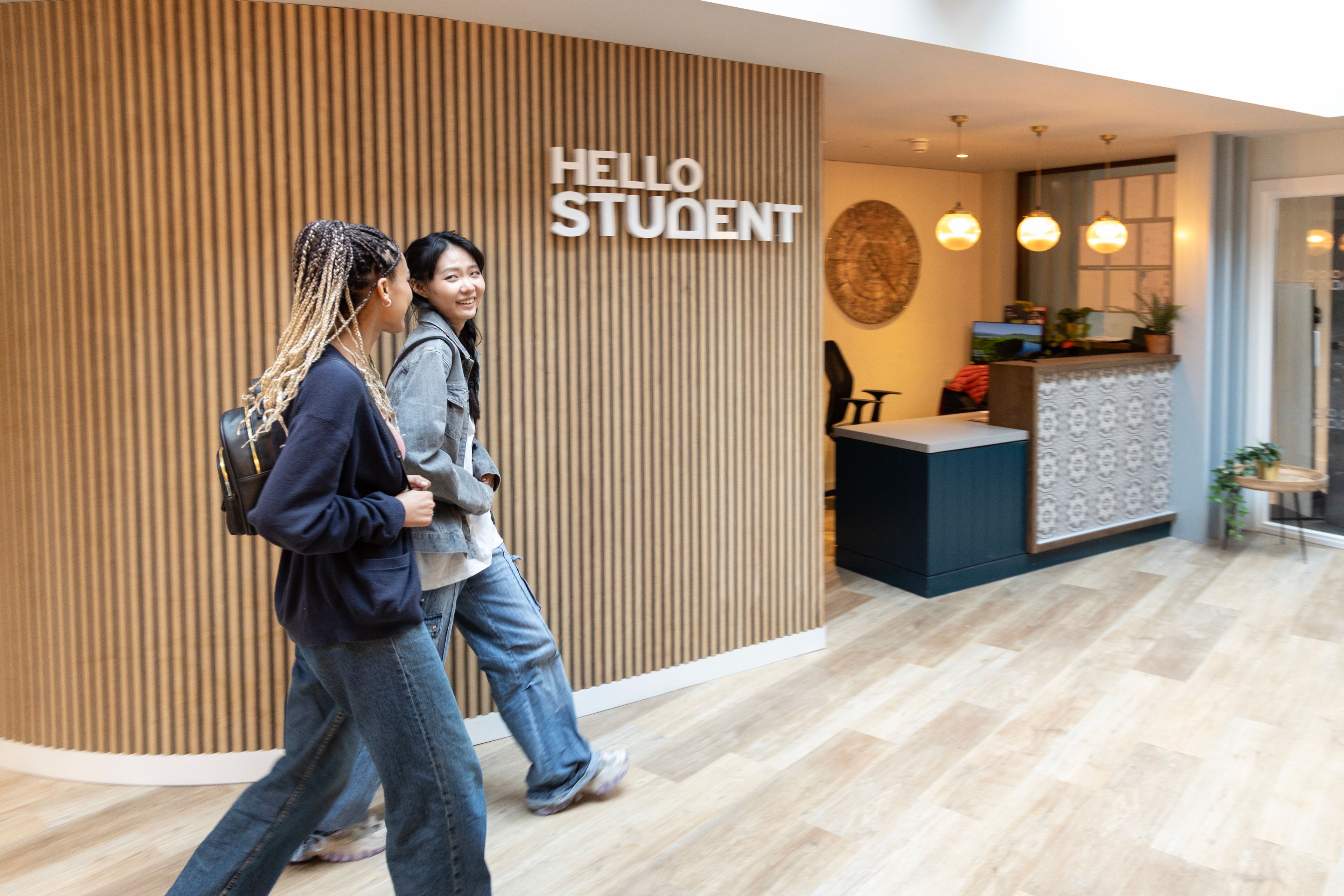Student work experience. A guide to career success
By Hello Student
Student Guide

Finding your feet in the professional world can feel daunting, but with the right preparation and a proactive approach, you can gain valuable experience that sets you up for career success. This guide will walk you through the importance of work experience for students, how to find the right opportunities, and how to make the most of them. At Hello Student, we understand the challenges and excitement of this journey, and we’re here to support you every step of the way. We know that balancing studies with the search for work experience can be tough, so we aim to provide a supportive environment that allows you to focus on your goals.
Why is work experience important?
Work experience is more than just a line on your CV; it’s a crucial stepping stone towards a fulfilling career. It provides practical skills, industry insights, and networking opportunities that can significantly impact your future prospects. It also demonstrates a proactive and driven attitude, qualities highly valued by employers.
Boost your employability:
In such a competitive job market, a degree alone often isn’t enough. Employers seek graduates with practical experience and demonstrable skills. They want to see evidence that you can apply your academic knowledge in real-world situations and contribute effectively to a team. Work experience provides the opportunity to develop crucial soft skills like communication, teamwork, and problem-solving, making you a more attractive candidate. By applying theoretical knowledge in a real-world setting, you gain a deeper understanding of your chosen field and demonstrate your ability to contribute effectively. This practical experience can set you apart from other graduates who may lack this vital hands-on experience.
Explore career paths:
Unsure about which career path to pursue? Work experience allows you to explore different fields and gain firsthand insight into various roles. This hands-on experience can help you discover your passions and clarify your career goals, saving you valuable time and effort in the long run. It can also help you identify areas you don’t want to pursue, which is equally valuable in shaping your career direction. Even if an experience confirms that a particular field isn’t for you, it’s still a valuable lesson learned and helps refine your career direction. This exploration of work experience ideas can be particularly beneficial for students unsure of their career path after graduation.
Build your network
Work experience provides invaluable networking opportunities. Connecting with professionals in your field can open doors to future opportunities, mentorship, and industry insights. Building a strong professional network can be just as important as developing your skills, as it provides access to hidden job markets and valuable career advice. These connections can lead to recommendations, referrals, and even future job offers. Networking also allows you to learn from experienced professionals and gain a deeper understanding of the industry landscape.
Earn while you learn (sometimes!):
While not all work experience is paid, the skills and experience gained are invaluable. Paid work experience offers the obvious financial benefit, allowing you to gain experience while supporting your studies. This can alleviate financial pressures and provide valuable budgeting experience. Even unpaid internships can provide valuable skills and significantly boost your CV, demonstrating your commitment to your chosen field.
Are there paid work experience opportunities for university students? Yes, some work experience opportunities are paid, particularly internships and part-time roles within companies. While competition for paid positions can be higher, it’s definitely worth exploring these options. Look for companies that value student contributions and offer competitive internship programmes. Remember, even unpaid work experience offers significant long-term benefits by enhancing your skills and employability. It’s an investment in your future.
Landing the right work experience: A step-by-step guide
Securing the right work experience requires a proactive and strategic approach. Here’s a step-by-step guide on how to get work experience:
Find work experience opportunities:
Start your search by utilising your university’s career services. They often have listings for internships, placements, and part-time jobs relevant to your field. They can also offer guidance on CV writing, interview skills, and job searching strategies. Online platforms like LinkedIn, Indeed, and specialist internship websites are also valuable resources. Use targeted keywords related to your field and desired location to refine your search. Attend networking events, career fairs, and industry conferences to connect with potential employers and learn about available opportunities. These events offer a chance to make a strong first impression and showcase your enthusiasm. Many companies offer structured internship programmes, so research organisations in your chosen field and check their websites for application details. Don’t be afraid to reach out directly to companies you admire, even if they don’t have advertised internships.
Find work experience for international students in the UK:
International students in the UK may face unique challenges regarding work experience due to visa regulations and work restrictions. It’s crucial to understand your visa conditions and permissible work hours. Your university’s international student support office can provide guidance on visa requirements and work eligibility. They can also advise on specific opportunities available to international students. The UK government website (gov.uk) also offers comprehensive information on visa regulations for international students. Always consult official resources for accurate and up-to-date information. Don’t hesitate to seek clarification if anything is unclear.
Update your CV
Once you’ve identified a promising opportunity, tailor your CV to the specific role. Highlight relevant skills and experiences that align with the job description. Use keywords from the job advert to
demonstrate your suitability. Quantify your achievements whenever possible, using numbers and data to showcase your impact. Remember, a well-crafted CV is your first impression, so make it count. Proofread carefully for any errors in grammar or spelling, as these can create a negative impression. Consider using a professional CV template to ensure a clean and organised layout. Seek feedback from your university’s career services for further refinement. For a full guide on how to craft an amazing CV, click here.
Write a compelling cover letter
A strong cover letter is essential for showcasing your personality and demonstrating your genuine interest in the role. Tailor your cover letter to each application, highlighting how your skills and experiences align with the specific requirements of the job. Explain why you’re interested in the company and the position, and how your career aspirations align with their mission. Show enthusiasm and passion for the opportunity. Address your cover letter to a specific person whenever possible, showing that you’ve taken the time to research the company. Keep it concise and focused, highlighting your most relevant skills and experiences. Conclude by reiterating your enthusiasm and expressing your availability for an interview. For tips on how to write a cover letter, click here.
How to prepare for interviews:
Thorough interview preparation is key to success. Research the company, understand the role, and practice answering common interview questions. Use the STAR method (Situation, Task, Action, Result) to structure your responses to behavioural questions, providing specific examples to illustrate your skills and experiences. Practicing with a friend or careers advisor can help build your confidence and refine your interviewing technique. Prepare thoughtful questions to ask the interviewer, demonstrating your genuine interest and engagement. Consider the dress code for the interview and choose an outfit that projects professionalism. Plan your route in advance to ensure you arrive on time, or even a few minutes early. Remember to bring extra copies of your CV and any relevant portfolio materials.
Make the most of your work experience
Once you’ve secured work experience, make the most of every opportunity to learn and grow.
Professionalism is key:
Maintain a professional demeanour throughout your work experience. Be punctual, communicate effectively, and demonstrate a positive attitude. Dress appropriately for the work environment and respect company policies and procedures. Be proactive and take initiative whenever possible.
Actively learn and seek feedback:
Be proactive in your learning. Ask questions, seek clarification when needed, and take the initiative to contribute to projects. Request feedback on your performance to identify areas for improvement and demonstrate your commitment to professional development. Embrace challenges as opportunities for growth.
Document your achievements:
Keep a record of your accomplishments, contributions, and new skills acquired during your work experience. This documentation will be invaluable when updating your CV, preparing for future interviews, and reflecting on your professional growth. This record can also help you identify areas of strength and areas where you’d like to develop further.
Work experience is a vital investment in your future career. It equips you with the practical skills, industry knowledge, and professional network necessary to thrive in a competitive job market. By following the steps outlined in this guide, you can confidently navigate the process of finding and maximising the benefits of work experience.

At Hello Student, we’re dedicated to supporting your journey towards career success. Live with us as we support you during university. We provide a comfortable and supportive environment that allows you to focus on your studies and career aspirations, whether you prefer shared apartments, one bedroom apartments, or townhouses for a homely feel.
Want to read more?
Check out our student hub for the latest news and blogs in our Hello Hub!
From how to cure freshers flu to top tips for graduate CVs we’ve got everything you need all in one place.
Ready to kickstart your student
journey with Hello Student?
Join the thousands of students who live with us across the UK.